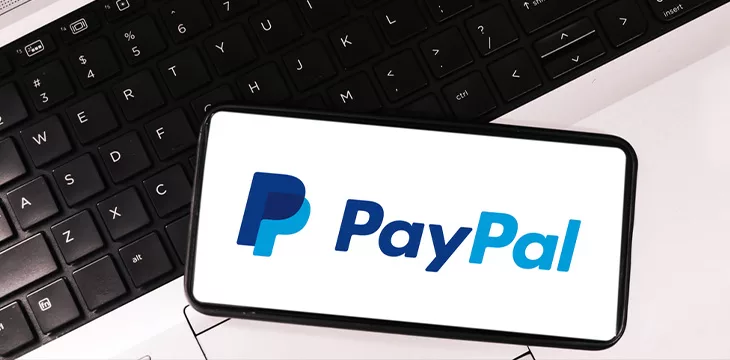|
Getting your Trinity Audio player ready...
|
PayPal (NASDAQ: PYPL) is under investigation by America’s securities regulator in relation to the payment processing giant’s new stablecoin that launched this summer.
On November 1, PayPal issued its Q3 earnings report, showing respectable revenue growth, operating income, and profit for the three months ending September 30. But in a separate filing with the U.S. Securities and Exchange Commission (SEC), PayPal revealed that the very same day “we received a subpoena from the U.S. SEC Division of Enforcement relating to PayPal USD stablecoin. The subpoena requests the production of documents. We are cooperating with the SEC in connection with this request.”
In August, PayPal announced the launch of its new U.S.-dollar denominated stablecoin PYUSD, with which PayPal had partnered with New York-based Paxos Trust. The launch was significant, marking the first stablecoin issued via a partnership with a major fiat-based payment processor.
PYUSD launched slowly, starting with a mint of only around $44 million, but has steadily increased its supply to around $159 million. Exchange adoption has also grown, although the fact that nearly half of all PYUSD trading volume occurs on Justin Sun’s HTX (formerly Huobi) exchange probably doesn’t help PayPal’s efforts to paint their new stablecoin as an upstanding exception in a sector primarily populated by criminals.
PayPal originally planned to launch PYUSD much earlier but paused these plans in February after New York’s Department of Financial Services (NYDFS) ordered Paxos to halt further issuance of BUSD, the stablecoin Paxos issued on behalf of the Binance exchange. That order followed revelations that Binance was issuing its own version of BUSD that wasn’t backed by sufficient fiat reserves.
Shortly before the NYDFS action, the SEC sent Paxos a Wells notice advising them of a looming action against the firm based on the regulator’s view that BUSD was an unregistered security. The SEC separately accused Binance of actively promoting the earning potential of “the BUSD ecosystem” by offering exchange customers rewards for staking their BUSD.
At the time, Paxos rejected the SEC’s view that BUSD was a security, although the New York firm agreed to cooperate with the securities watchdog. Circle, the U.S.-based issuer of the USDC stablecoin, later filed an amicus curiae brief in the SEC v. Binance suit, arguing that “payment stablecoins” are exempt from securities laws because they “do not have the essential features of an investment contract.”
Circle acknowledged that the SEC may have a point regarding the “transactional context” of Binance having “marketed and sold BUSD in a way that caused BUSD buyers to expect profits based on Binance’s efforts.” But Circle argued that “sales of payment stablecoins, without more, are just asset sales,” and as such, users have no expectation of profiting from acquiring/holding them.
Beyond its original filing, neither PayPal nor the SEC have offered any public comment about the SEC subpoena and analysts didn’t ask about the dustup on PayPal’s Q3 earnings call. PayPal CEO Alex Chriss did briefly reference the PYUSD launch, but only to herald its launch as helping to create “one of the most robust peer-to-peer networks in the world.”
UK A-OK
The SEC news spoiled what was otherwise a winning week for PayPal’s digital asset push, including its U.K. division receiving a registration with the Financial Conduct Authority (FCA) to offer “certain cryptoasset activities.” The registration, which took effect on October 31, permits PayPal UK Limited to promote its digital asset offering to customers under the country’s strict marketing rules.
The FCA has imposed some restrictions on PayPal, including “ceasing on-boarding new customers and restricting existing customers to hold and sell functionality.” PayPal is also currently barred from participating in various products/services, including initial coin offerings, staking, peer-to-peer digital asset transfers, DeFi activities such as lending/borrowing, or operating ‘crypto’ automated teller machines.
While severely limited for the present, PayPal’s registration does offer entry into what is so far a pretty exclusive club. To date, only a handful of applicants have garnered similar FCA registration approval. To keep the FCA on its side, PayPal took the precautionary step of temporarily barring its U.K. customers from purchasing digital assets via its platform.
PayPal was a relatively early adopter in incorporating digital assets into its existing fiat processing platforms, including its Venmo mobile P2P payment service. PayPal also offers a ‘Checkout with Crypto’ feature that allows U.S. users to purchase products and services online with certain digital assets—BTC, BCH, ETH, LTC, and now PYUSD—they hold on the platform. However, these assets are converted to fiat at the moment of purchase to appease skittish merchants not set up for actual digital asset commerce.
While PayPal’s earnings reports don’t (yet) break out its digital asset transaction revenue as a separate item, the company continues showing keen interest in the digital asset space. Last month, it revealed that it had filed an application in March for a (likely) Ethereum-based “non-fungible token (NFT) purchase and transfer system.”
Just remember, guys, don’t tell any customer that their NFTs could dramatically appreciate in value. Otherwise, Gary Gensler will pop around with something far worse than a subpoena.
Watch: Digital currency regulation and the role of BSV blockchain

 02-16-2026
02-16-2026 




